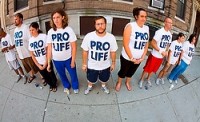June 25, 2013 // Uncategorized
Court kicks back college quotas case; takes clinic protests, visa cases
By Patricia Zapor

Pro-life activists from Crossroads USA pray across from a Planned Parenthood clinic on Commonwealth Avenue in Boston in this July 2007 file photo. The U.S. Supreme Court June 24 agreed to hear a case challenging a 2007 Massachusetts law barring protests in 35-foot “buffer zones” around abortion clinic entrances, exits and driveways. (CNS photo/Gregory L. Tracy, The Pilot)
WASHINGTON (CNS) — The Supreme Court June 24 kicked back a university affirmative action case to a lower court and took cases for the next term dealing with buffer zones for protests at abortion clinics and whether the children of immigrants lose their place in line for visas when they turn 21.
Remaining cases to be announced include the two dealing with same-sex marriage: one challenging the federal Defense of Marriage Act, which defines marriage as only between one man and one woman, and the other challenging California’s Proposition 8, a ballot initiative approved by voters in 2008 to ban same-sex marriage.
As the court’s term draws to a close in the final week of June, the ruling in Fisher v. University of Texas-Austin cleared from the court’s docket the case that had been on their “to-come” list the longest. The court heard oral arguments in October in the case over whether Amy Fisher, who is white, was unfairly denied enrollment at the university because of race-based admissions criteria.
In a 7-1 ruling written by Justice Anthony Kennedy, the court sent the case back to the 5th U.S. Circuit Court of Appeals to reconsider it under an exacting standard of strict scrutiny to two previous Supreme Court rulings dealing with the Equal Protection clause of the Constitution.
Justice Elena Kagan did not participate in the case, possibly because it dealt with decisions handled during her service as at the Justice Department prior to her appointment to the Supreme Court. Justice Ruth Bader Ginsburg dissented, saying she would have let the 5th Circuit ruling — which upheld the university’s admissions policy — stand.
Among 10 cases the court announced it has accepted for the term that begins Oct. 7 is one challenging the constitutionality of a Massachusetts law barring people from within a 35-foot “buffer zone” of abortion clinic entrances, exits and driveways for the purpose of speaking about opposition to abortion.
The 1st U.S. Circuit Court Court of Appeals upheld the law as protecting patients and clinic employees “without offending the First Amendment rights of others.” The case is McCullen v. Coakley.
The immigration case added to the docket, Mayorkas v. Cuellar de Osorio, deals with the problem of the decades-long wait for many categories of immigration applications to be considered.
One example cited in the petition to the court to take the case was of a man whose U.S. citizen sister applied for a visa on his behalf, including his then-minor daughter as a derivative beneficiary. By the time the petition for the man was granted a decade later, his daughter was over 21 and ruled ineligible to receive a visa derived through her aunt. She would have to begin the process again, as a beneficiary of her father’s status, beginning another multi-year wait.
In its ruling, the 9th U.S. Circuit Court of Appeals said the U.S. Citizenship and Immigration Services agency violates a 2002 law, the Child Status Protection Act.
That ruling cited several cases, including that of Lorenzo Ong, whose U.S. citizen sister filed a petition on his behalf in 1981, when his daughters were ages 2 and 4. In 2002, when his application became “current,” meaning he was eligible for one of the limited number of immigration slots for siblings of citizens, his daughters had aged out of eligibility. When Ong became a legal permanent resident, he filed petitions for his daughters and requested the “priority date” of 1981. When the agency did not respond to that request he joined a lawsuit.
The first part of the calendar for when cases in the upcoming term will be heard will be released sometime this summer.
The best news. Delivered to your inbox.
Subscribe to our mailing list today.





